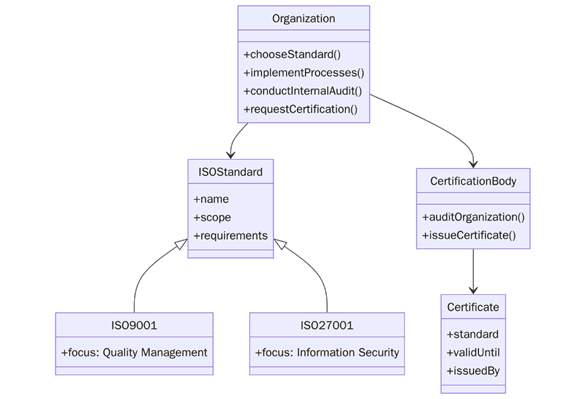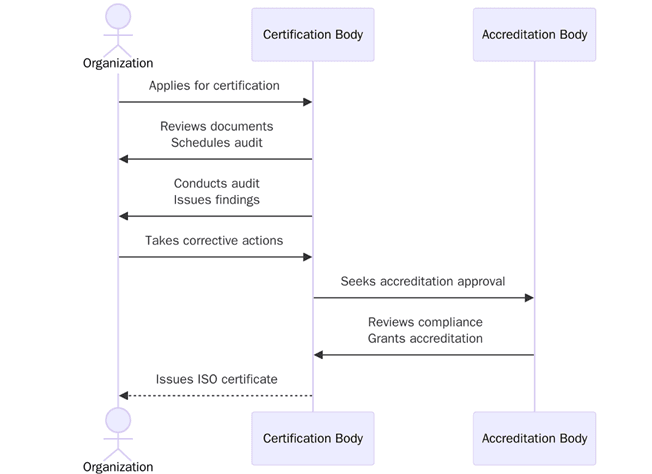Know the Difference Between ISO Certification and Accreditation

Quick Summary
Certification and accreditation are closely related but distinct in the ISO context. ISO certification refers to a valid, third‑party confirmation that an organization’s management system meets specified ISO standards—typically granted after a successful audit, valid for around three years, with annual surveillance audits. In contrast, ISO accreditation applies to the certification bodies themselves—it’s formal recognition by national or international accreditation authorities (like UKAS, ANSI, or JAS‑ANZ) affirming the body’s competence, impartiality, and ability to conduct valid ISO assessments. Accreditation ensures that certification providers follow rigorous, consistent practices, and it underpins the global trustworthiness of ISO certifications.
Introduction
In conversations about the subject of ISO standards, two terms come up often, certification and accreditation. While both terms are related, checklists, practices and regulations in terms of quality management, compliance or compliance and industry standards, they do represent two different aspects of the question. Understanding the difference between ISO certification and ISO accreditation is important to organizations working toward establishing quality management systems and for individuals wanting to understand the certification process in more detail. In this blog, we will unpack the differences between ISO certification and ISO accreditation, as well as provide greater clarity on how each term is applied in "real life."
ISO (International Organization for Standardization) is recognized around the globe for developing international standards in many sectors. Whether you want to improve product quality, manage environmental impacts or provide information security, ISO standards provide full-cycle guidance to help your organization align with recognized best practices globally.
However, before you can start implementing ISO standards, you must know the difference between certification and accreditation. While both are necessary to protect the integrity of ISO standards, they serve different functions in the steps you will take. Let's examine both in detail to understand what their roles are in ISO compliance.
For assistance, contact us at [email protected].
What is ISO Certification?
ISO certification implies an organization has been audited by an accredited certification body to confirm that its systems, processes or products comply with a specified ISO standard. Certifying that an organization is following internationally accepted standards and best practices.

In the certification process, an organization will be evaluated based on their quality management system (QMS), information security management, environmental management practices, or other types of systems or operations that meet the ISO standard. The certification is performed by an independent third-party organization. If the organization being audited meets the criteria, they will be issued an ISO certificate concerning the audit details.
ISO Certification Highlights:
• An ISO certification is awarded to an organization to confirm that its practices meet the specific criteria defined by the ISO (i.e., ISO 9001, Quality Management, ISO 27001 Information Security).
• The focus of the certification process is on evaluating the organization's systems, processes or management practices and evaluating them against ISO guidance.
• An ISO certification is issued by independent accredited certification bodies after audits confirm compliance.
• ISO certifications are typically valid for 3 years requiring at minimum annual on-going surveillance to maintain the certification.
• There is no doubt that certification showcases compliance with international standards and helps organizations show their commitment to quality, customer satisfaction and continual improvement.
What is ISO Accreditation?
ISO accreditation is formal recognition of a certification body (which is often called a third-party assessment body) by a national or international accreditation organization. The accreditation tells us that the certification body has the qualifications and competency to do audits and approve ISO certifications/registration in a defined area of expertise.

In short, accreditation only speaks to the certification body itself, which is an organization that provides ISO certifications. Accreditation shows that the organization granting ISO certifications follows strict international standards in relation to auditing practices, assessment methodologies and competencies. Accreditation bodies (e.g., ANSI - American National Standards Institute; UKAS - United Kingdom Accreditation Service; JAS-ANZ - Joint Accreditation System of Australia and New Zealand) evaluate the technical competence and impartiality of the certification body before awarding accreditation.
Key Characteristics of ISO accreditation:
• Accreditation is awarded to an organization (certification body) that assesses and audits an organization for the purposes of determining compliance to ISO standards.
• Accreditation indicates a certification body has the qualifications to audit and assess an organization's compliance against ISO standards.
• Accreditation is usually based on national or international authorities, such as ISO or other governmental authorities, which ensure that the certifying body creates certification that meets recognized practices.
• Accredited certification bodies provide assurance that the evaluation processes are consistent, independent, and valid globally.
• Accreditation is design to protect everyone, certifies that the certification bodies are internationally acceptable and competent to evaluate the organization's compliance with ISO standards.
For assistance, contact us at [email protected].
Key Differences Between ISO Certification and Accreditation
Now that we understand what each term represents, let's summarize the key differences between ISO certification and ISO accreditation:
Why Both ISO Certification and Accreditation Matter?
Although ISO certification and ISO accreditation are both important parts of the ISO compliance journey, they have different but complementary functions.
For an organization seeking ISO certification, the certificate itself represents something tangible and definitive that shows to others that their systems and processes meet internationally recognized standards thus allowing for credibility, quality commitment and competitive edge in the market.
ISO accreditation provides assurance to businesses that the certification body that is evaluating their organization is qualified, impartial and complies with a known and proven auditing protocol, which means that the certification process can be trusted; the reliability of the certification process would be difficult to trust without an accredited certification body and ISO certification would have little value without the uniformity of an accreditation body.
Finally, accreditation bodies focus on maintaining the integrity of the ISO certification system, which is paramount to maintain international credibility on the standard.
Contact Us
Pacific Certifications can guide your organization through the ISO certification process, ensuring that you select the right certification body and achieve ISO compliance efficiently.
For assistance, contact us at [email protected].
Visit our website at www.pacificcert.com.
Contact Us
If you need support with ISO certification, contact us at [email protected].
Read More at: Blogs by Pacific Certifications

